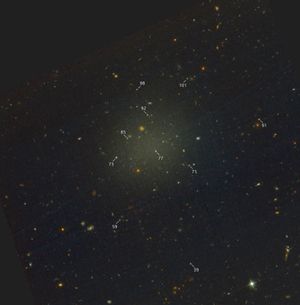“NGC1052-DF2”的版本间差异
跳到导航
跳到搜索
无编辑摘要 |
无编辑摘要 |
||
| 第1行: | 第1行: | ||
*号称没有暗物质的星系, ultra diffuse galaxy [https://arxiv.org/abs/1803.10237] '''Nature March 2018''' [[文件:NGC1052-DF2.JPG|缩略图|HST/ACS image]] |
*号称没有暗物质的星系, ultra diffuse galaxy [https://arxiv.org/abs/1803.10237] '''Nature March 2018''' [[文件:NGC1052-DF2.JPG|缩略图|HST/ACS image]] |
||
==观测== |
|||
:*S´ersic index n = 0.6, axis ratio b/a = 0.85, the central surface brightness is µ(V606,0) = 24.4magarcsec−2, D=20Mpc. |
:*S´ersic index n = 0.6, axis ratio b/a = 0.85, the central surface brightness is µ(V606,0) = 24.4magarcsec−2, D=20Mpc. |
||
:* effective radius along the major axis is Re = 2.2kpc, M606 = −15.4 mag, Mstars ≈ 2×10^8 Msun. |
:* effective radius along the major axis is Re = 2.2kpc, M606 = −15.4 mag, Mstars ≈ 2×10^8 Msun. |
||
| 第6行: | 第8行: | ||
:*气体含量非常低 arXiv:1810.04938 arXiv:1901.07586 |
:*气体含量非常低 arXiv:1810.04938 arXiv:1901.07586 |
||
==模型== |
|||
* |
*really |
||
:*测量误差很大,不能说得那么肯定 [https://arxiv.org/abs/1804.04136] |
:*测量误差很大,如果有些球状星团是背景,不能说得那么肯定 [https://arxiv.org/abs/1804.04136] |
||
:*如果没有暗物质,星系和球状星团质量的比靠近,动力学摩擦效应显著,哪些星团已经并合了[https://arxiv.org/abs/1806.01812] |
:*如果没有暗物质,星系和球状星团质量的比靠近,动力学摩擦效应显著,哪些星团已经并合了[https://arxiv.org/abs/1806.01812] |
||
:*考虑NGC1052的tidal效应,改变了DF2中球状星团在相空间的分布函数 (真实空间外围的GC少了,GC在速度空间的弥散小了) [https://arxiv.org/abs/1810.03864] |
:*考虑NGC1052的tidal效应,改变了DF2中球状星团在相空间的分布函数 (真实空间外围的GC少了,GC在速度空间的弥散小了) [https://arxiv.org/abs/1810.03864] |
||
:*没有暗物质的dynamical friction没那么简单, core-stalling and GC-GC interactions效应, 让星团掉不进去。反过来,如果有cuspy的NFW暗晕,里面的dynamical friction更强,会形成核心GC [https://arxiv.org/abs/1902.05959 ] |
:*没有暗物质的dynamical friction没那么简单, core-stalling and GC-GC interactions效应, 让星团掉不进去。反过来,如果有cuspy的NFW暗晕,里面的dynamical friction更强,会形成核心GC [https://arxiv.org/abs/1902.05959 ] |
||
* |
*MOND |
||
:*不支持MOND,弱引力场(近似于有暗物质)[https://arxiv.org/abs/1804.04167] |
:*不支持MOND,弱引力场(近似于有暗物质)[https://arxiv.org/abs/1804.04167] |
||
:*你没考虑NGC1052作用,符合MOND! [https://arxiv.org/abs/1903.11612] '''Nature March 2019''' |
:*你没考虑NGC1052作用,符合MOND! [https://arxiv.org/abs/1903.11612] '''Nature March 2019''' |
||
-- |
---- |
||
* NGC1052-DF4, same group,第二个号称没有暗物质的星系 [https://arxiv.org/abs/901.05973](还是球状星团算的速度弥散度) |
* NGC1052-DF4, same group,第二个号称没有暗物质的星系 [https://arxiv.org/abs/901.05973](还是球状星团算的速度弥散度) |
||
2019年3月29日 (五) 04:19的版本
- 号称没有暗物质的星系, ultra diffuse galaxy [1] Nature March 2018
观测
- S´ersic index n = 0.6, axis ratio b/a = 0.85, the central surface brightness is µ(V606,0) = 24.4magarcsec−2, D=20Mpc.
- effective radius along the major axis is Re = 2.2kpc, M606 = −15.4 mag, Mstars ≈ 2×10^8 Msun.
- an extraordinary population of globular clusters, larger and more luminous than average GCs in the Milky Way, total mass is roughly 4 percent of the mass in stars, making DF2 one of the galaxies with the largest specific frequencies known.
- the line-of-sight velocity dispersion of the GCs(10km/s) suggests a total dynamical mass for DF2 that leaves little room for any dark matter
- 气体含量非常低 arXiv:1810.04938 arXiv:1901.07586
模型
- really
- MOND
- NGC1052-DF4, same group,第二个号称没有暗物质的星系 [8](还是球状星团算的速度弥散度)
